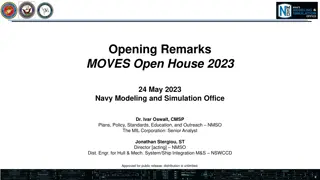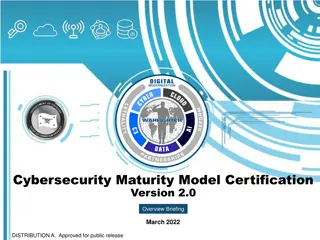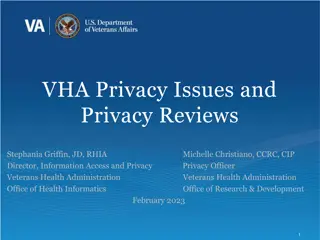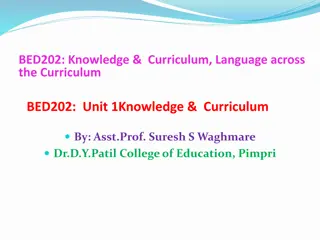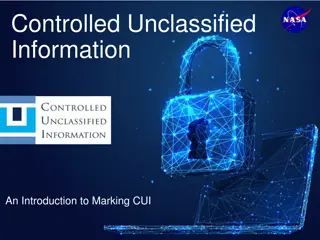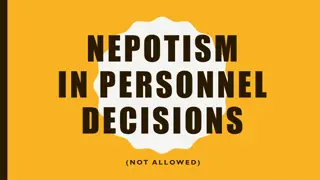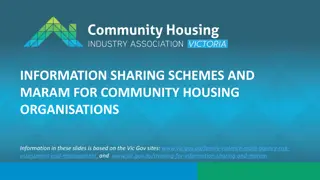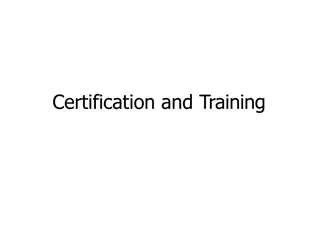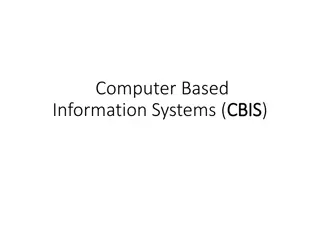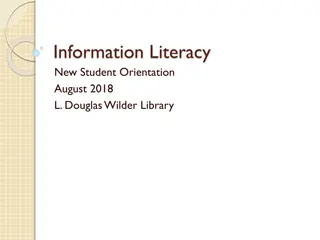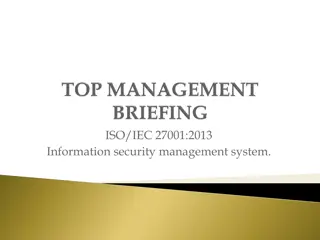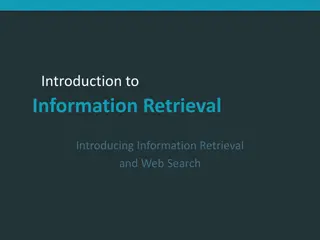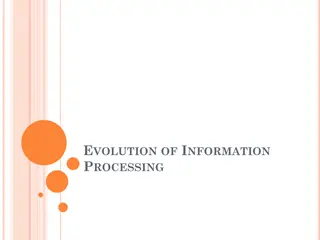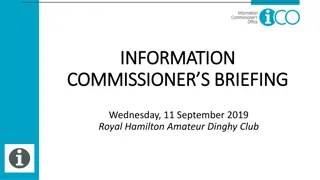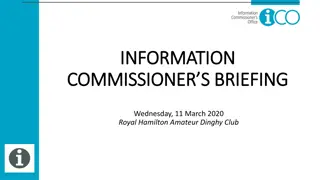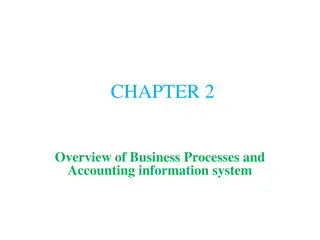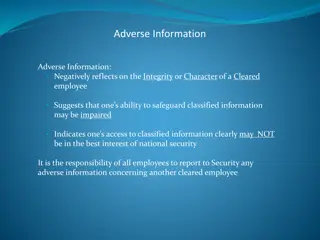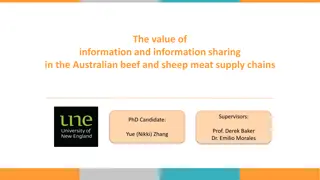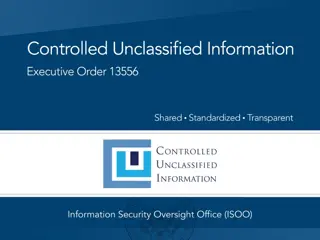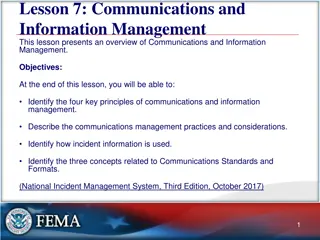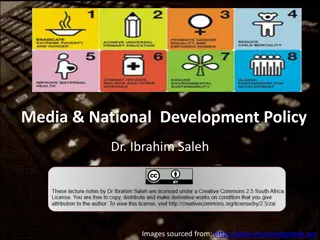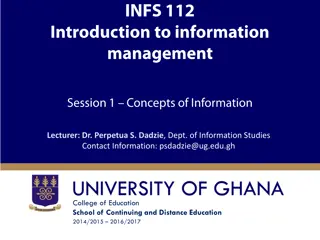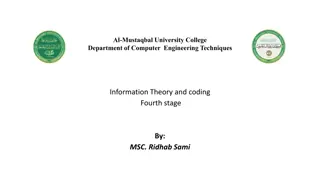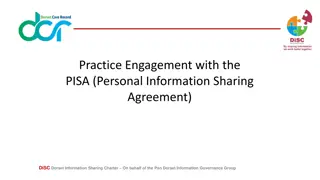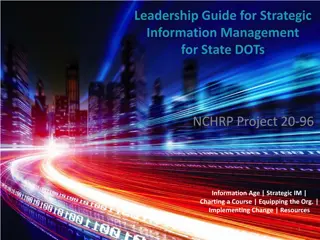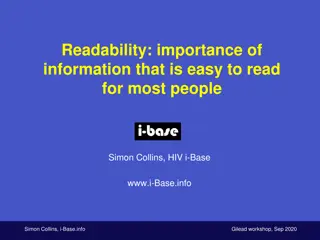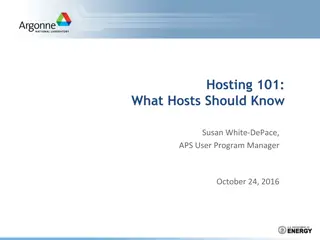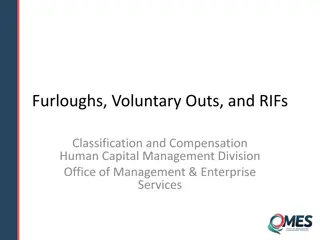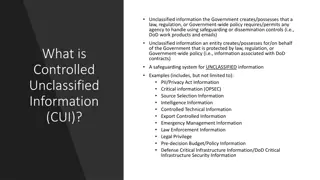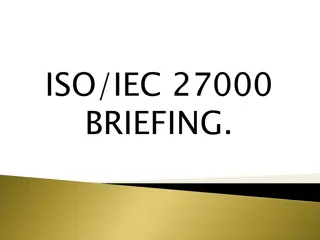Understanding Information Systems in Organizational Management
Management in organizations is divided into three levels: operational, tactical, and strategic. Each level requires different information systems to support various activities. Operational systems focus on routine transactions and control processes, while middle-level systems aid in semi-structured
9 views • 39 slides
Navy Modeling and Simulation Office Open House 2023 Overview
The UNCLASSIFIED Opening Remarks at the Navy Modeling and Simulation Office's Open House 2023 highlight the need for innovation and agility in computational technology. Emphasizing the importance of Don M&S Vision and Engineering Initiatives, the event focuses on leveraging advanced technologies lik
1 views • 8 slides
Overview of CMMC 2.0 Cybersecurity Maturity Model Certification
The CMMC 2.0 introduces a streamlined model with three levels, focusing on protecting controlled unclassified information (CUI) with requirements aligned with NIST standards. Assessments vary for each level, including self-assessments for Level 1 and third-party assessments for Level 2. Government o
3 views • 8 slides
Understanding VA Privacy Issues and Sensitive Information
Explore the complex landscape of VA privacy issues, including data relationships, sensitive personal information (SPI), personally identifiable information (PII), individually identifiable information (III), and individually identifiable health information (IIHI). Learn about the roles and responsib
0 views • 29 slides
Understanding Data, Information, Knowledge, and Curriculum in Education
Data is raw facts and figures, information is interpreted data with meaning, and knowledge is the accumulation of facts and information. The nature of knowledge involves acquiring information from real-life experiences and education. This content delves into the distinctions between data, informatio
0 views • 64 slides
Introduction to Controlled Unclassified Information (CUI) Marking
Controlled Unclassified Information (CUI) is sensitive information requiring protection under laws and regulations. This introduction covers the definition of CUI, why marking is important, categorization, basic vs specified CUI, and examples of information types requiring protection. Improper safeg
0 views • 9 slides
Guidelines and Regulations on Nepotism in Personnel Decisions
Wisconsin statutes and university policies prohibit nepotism in personnel decisions. State public officials, unclassified staff, and university staff have specific rules to follow, such as not participating in decisions involving immediate family members. Immediate family is defined broadly to inclu
0 views • 13 slides
Understanding Information Centres: Types and Organization
Modern libraries are evolving into information centres, offering precise information to users. They bridge the gap between user needs and available information. Information centres play a crucial role in providing timely and relevant information, aiding in decision-making and preventing duplication
0 views • 28 slides
Information Sharing Schemes and MARAM for Community Housing Organizations
These slides provide insights on information sharing schemes and the MARAM framework designed for community housing organizations to promote the wellbeing and safety of children, assess family violence risks, and enhance collaboration across service sectors. The Child Information Sharing Scheme (CIS
2 views • 15 slides
Inter-Cluster Coordination and Information Management in Humanitarian Emergencies
Inter-Cluster Coordination and Information Management play vital roles in humanitarian emergencies. The coordination mechanism involves regular meetings convened by the RC/HC and coordinated by OCHA, providing opportunities for clusters to collaborate on shared planning, needs assessments, and poole
3 views • 13 slides
Certification and Training in Information Security
This content covers various aspects of certification and training in the field of information security, including organizational information security outlines, positions in information security personnel, and professional certifications from renowned organizations. It also provides insights into dif
0 views • 18 slides
Understanding Computer-Based Information Systems (CBIS)
Computer-Based Information Systems (CBIS) transform raw data into valuable information to support decision-making, coordination, and control. CBIS utilize computers to collect, process, analyze, and distribute information efficiently. Data is the raw material, while information is the processed data
0 views • 27 slides
Understanding Information Literacy: A Comprehensive Guide for Students
Information literacy is crucial for academic success. It involves the ability to recognize the need for information, locate relevant sources, evaluate their credibility, and effectively use the information for research and presentations. Primary and secondary sources play a vital role in gathering i
0 views • 19 slides
Understanding ISO/IEC 27001:2013 Information Security Management System
Overview of ISO/IEC 27001:2013 standard for information security management system (ISMS). Learn about the importance of protecting information assets, preserving confidentiality, integrity, and availability of information, and steps to certification. Enhance understanding of different types of info
0 views • 35 slides
Introduction to Information Retrieval and Web Search
Information Retrieval (IR) involves finding unstructured material, typically text documents, within large collections stored on computers to satisfy information needs. This process extends beyond web search to include email search, corporate knowledge bases, and legal information retrieval. The text
0 views • 53 slides
Evolution of Information Processing in Computerization
Evolution of information processing from raw data to useful information through computerization. Data is collected, processed, and converted into valuable insights for decision-making. The growth of complexity led to the development of Information Technology, enabling efficient creation, processing,
0 views • 7 slides
Information Commissioner's Briefing at Royal Hamilton Amateur Dinghy Club
The Information Commissioner's Briefing held at Royal Hamilton Amateur Dinghy Club covered topics related to the Public Access to Information Act in Bermuda. The briefing emphasized the rights of Bermudians and residents to access public records, the role of the Information Commissioner in promoting
0 views • 51 slides
Information Commissioner's Role in Bermuda's Public Access to Information
The Information Commissioner in Bermuda plays a crucial role in promoting public access to information, ensuring compliance with the PATI Act, and safeguarding the right to access public information. This independent office provides guidance to public authorities, oversees enforcement activities, an
0 views • 37 slides
Understanding Business Processes and Accounting Information Systems
This chapter provides an overview of essential business activities, decisions, and information required for organizational operations. It discusses the role of the data processing cycle in organizing activities and supplying information to users. Various types of information needed for decision-maki
0 views • 62 slides
Understanding Adverse Information Reporting in National Security
This detailed content covers the importance of reporting adverse information regarding cleared employees in national security settings. It outlines the impact of adverse information on security clearances, the 13 adjudicative guidelines used in determining eligibility for sensitive duties, NISPOM re
0 views • 15 slides
Enhancing Information Sharing in Australian Meat Supply Chains
This research delves into the value of information and information sharing within the beef and sheep meat supply chains in Australia. It explores the benefits of improved decision-making, reduced costs, and enhanced supply chain performance through strategic information sharing. The study also ident
1 views • 21 slides
Centralized Unified Information Program Overview
The Centralized Unified Information (CUI) Program aims to establish a uniform system for safeguarding and disseminating unclassified information across executive departments and agencies. Executive Order 13556 mandated the program to address the patchwork of policies present, promoting clarity, cons
2 views • 16 slides
Avoco's Cloud-Based Information Card Selector: Enhancing Usability and Security
Avoco's Cloud-Based Information Card Selector is a leap forward in Information Card usability, offering benefits such as universal access to Information Cards, zero footprint for end users, and enhanced security features. The platform allows for easy creation, import, and backup of cards, as well as
0 views • 29 slides
Geological Information System for Europe: EGDI-Scope Progress Meeting 2014
Toward a Geological Information System for Europe (GISE), the EGDI-Scope project aims to support European Commission policies on mining wastes, Water Framework Directive (WFD), INSPIRE, biodiversity, water, air, and geology. By organizing an information system instead of a data infrastructure, it pr
0 views • 11 slides
Principles of NIMS Communications and Information Management
Effective emergency response relies on maintaining situational awareness through constant flow of information. This lesson covers key principles including interoperability, reliability, scalability, and portability for communication and information management in incidents. It emphasizes the need for
0 views • 27 slides
Performance Appraisals Overview and Analysis
This document presents data on classified and unclassified performance appraisals from November 2018 to present, including completion rates, due dates, and processes involved. It also includes information on revised due dates, email examples, and contact details for inquiries.
0 views • 11 slides
Challenges and Solutions in Information Literacy and Technology Development
The provided content delves into the critical topics of information literacy, digital ethics, and the equitable distribution of benefits from information and communication technologies. It emphasizes the need to address the hidden curriculum in education, improve information literacy skills, and und
0 views • 21 slides
Understanding Data, Information, and Knowledge in Information Studies
Data, information, and knowledge play vital roles in our lives and are essential in information studies. Dr. Perpetua Dadzie explores the definitions and distinctions among data, information, and knowledge, emphasizing the transformation process that turns raw data into meaningful information. The s
0 views • 23 slides
Information Systems in Organizations: Overview and Implementation
Information systems play a crucial role in organizations, encompassing transaction processing systems, functional area information systems, and enterprise resource planning systems. This content delves into the purpose of transaction processing systems, the support provided by information systems ac
0 views • 30 slides
Understanding the Role of Classified Information in Criminal Trials
In criminal trials, the handling of classified information is crucial and governed by specific rules. Defendants do not have an inherent right to access classified information, and there are procedures in place to determine its use in court. The rights surrounding secret evidence include protection
0 views • 43 slides
Understanding Information Entropy in Information Theory
Information entropy, a key concept in information theory, measures the average amount of information in a message. Source entropy and binary source entropy are explained with examples, along with maximum source entropy for both binary and non-binary sources. Learn how to calculate entropy for differ
0 views • 12 slides
Enhancing Information Sharing: DISC and PISA Benefits
DISC (Dorset Information Sharing Charter) and PISA (Personal Information Sharing Agreement) facilitate improved information sharing among healthcare organizations in Dorset. DISC establishes robust principles for managing data flow and promoting best practices in information governance, while PISA t
0 views • 8 slides
Leadership Guide for Strategic Information Management in State DOTs
This guide provides insights into maximizing the value of available information, enhancing efficiency in information collection and use, and improving organizational readiness. It addresses the evolving role of transportation agencies as facilitators of information and the significance of informatio
0 views • 27 slides
Importance of Readable Patient Information in Healthcare
Patient information plays a crucial role in healthcare, but the readability of this information is often overlooked. Simon Collins discusses how difficult text can create barriers to accessing healthcare and the importance of making patient information easy to understand. The talk emphasizes the nee
0 views • 37 slides
Understanding DOE Order 142.3A and Hosting Responsibility at Argonne
DOE Order 142.3A outlines the program for unclassified foreign national access to DOE sites, specifying approval processes and tracking systems like FACTS. Visits and assignments are differentiated, and foreign nationals are categorized into non-sensitive, sensitive, and State Sponsors of Terrorism
0 views • 17 slides
Sustainable Procurement Practices in Defense Department
Sustainable procurement practices play a crucial role in the Defense Department, focusing on reducing emissions, enhancing eco-labeling, and promoting administrative cooperation. Initiatives such as reciprocal defense procurement agreements and memoranda of understanding with qualifying countries co
0 views • 85 slides
Selling Information to Budget-Constrained Buyers
The images and descriptions discuss the concept of selling information through consulting, focusing on marketing, consumer information, and credit reports. Motivations for targeting budget-constrained buyers and the optimal mechanisms for selling information are explored. The content highlights mode
0 views • 26 slides
Furloughs, Voluntary Outs, and RIFs in Human Capital Management
Furloughs are the involuntary leave without pay of classified or unclassified employees to reduce costs or cope with temporary work declines. Appointing Authorities can implement furloughs for up to 184 hours in a 12-month period, with specified procedures and reasons for non-uniform treatment. Furl
0 views • 36 slides
Controlled Unclassified Information (CUI) Safeguarding Guidelines
Guidelines for handling Controlled Unclassified Information (CUI), including marking requirements, categories of CUI, and safeguarding procedures. Understand the difference between CUI FOUO (For Official Use Only) and CUI program, as well as minimum marking requirements for documents containing CUI.
0 views • 5 slides
Importance of Information Protection and Security Measures
Enhance understanding of information and information security, different types of information assets, classification of internal and confidential information, types of data, information life cycle, and potential risks if information is not well-protected.
0 views • 25 slides

